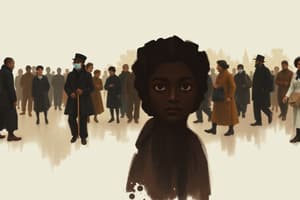Podcast
Questions and Answers
What is collective effervescence according to Durkheim?
What is collective effervescence according to Durkheim?
- The joy of participating in individual activities.
- The feeling of isolation during social events.
- Connection and meaning derived from individual experiences.
- The sense of connection and meaning from collective events. (correct)
Social structure refers solely to individual actions and choices.
Social structure refers solely to individual actions and choices.
False (B)
Explain reflexivity in the context of socialization.
Explain reflexivity in the context of socialization.
Reflexivity is the capacity to recognize and critique socialization forces and alter one's role in social structures.
The interchange between structure and agency that leads to changes in social systems is known as ___ .
The interchange between structure and agency that leads to changes in social systems is known as ___ .
Match the concepts with their definitions:
Match the concepts with their definitions:
What does the term agency imply in sociology?
What does the term agency imply in sociology?
Which statement best describes social integration?
Which statement best describes social integration?
Social structures have no impact on an individual's ability to create change.
Social structures have no impact on an individual's ability to create change.
Determinism in sociology argues that individual choices are completely independent of social structures.
Determinism in sociology argues that individual choices are completely independent of social structures.
Explain the concept of social determinism in sociology.
Explain the concept of social determinism in sociology.
How does social change relate to activism?
How does social change relate to activism?
AGENCY IMPLIES _______!
AGENCY IMPLIES _______!
Match the types of agency with their descriptions:
Match the types of agency with their descriptions:
Which of the following best reflects the interaction between structure and agency?
Which of the following best reflects the interaction between structure and agency?
Collective agency involves individuals acting alone without any influence from others.
Collective agency involves individuals acting alone without any influence from others.
What is a primary benefit of belonging to a group, as expressed by Émile Durkheim?
What is a primary benefit of belonging to a group, as expressed by Émile Durkheim?
What does Plummer suggest about agency in people’s lives?
What does Plummer suggest about agency in people’s lives?
Agency always promotes social justice and equality.
Agency always promotes social justice and equality.
What role does sociology play in understanding agency?
What role does sociology play in understanding agency?
The time period from 1980 to 1996 includes the generation known as ______.
The time period from 1980 to 1996 includes the generation known as ______.
Match the following concepts with their definitions:
Match the following concepts with their definitions:
In what way can agency be restricted?
In what way can agency be restricted?
Collective effervescence refers to the shared energy that can bring people together in social movements.
Collective effervescence refers to the shared energy that can bring people together in social movements.
How do structural forces intersect in personal experiences?
How do structural forces intersect in personal experiences?
Flashcards
Uneven Agency
Uneven Agency
The idea that not everyone has equal ability to influence their lives and the world around them. This differs by factors like social status.
Agency is not always progressive
Agency is not always progressive
The use of agency isn't always directed towards improvements in justice or equality or less divisiveness; it can help with things that aren't equitable.
Agency
Agency
The capacity of individuals to act independently and make choices.
Structure/Agency Debate
Structure/Agency Debate
Signup and view all the flashcards
Determinism
Determinism
Signup and view all the flashcards
Social Integration
Social Integration
Signup and view all the flashcards
Reflexivity
Reflexivity
Signup and view all the flashcards
Outsider status
Outsider status
Signup and view all the flashcards
Collective effervescence
Collective effervescence
Signup and view all the flashcards
Social integration
Social integration
Signup and view all the flashcards
Reflexivity
Reflexivity
Signup and view all the flashcards
Social change
Social change
Signup and view all the flashcards
Social structure
Social structure
Signup and view all the flashcards
Structure/Agency debate
Structure/Agency debate
Signup and view all the flashcards
Social statuses
Social statuses
Signup and view all the flashcards
Social roles
Social roles
Signup and view all the flashcards
Agency
Agency
Signup and view all the flashcards
Social Structures
Social Structures
Signup and view all the flashcards
Reflexive Agency
Reflexive Agency
Signup and view all the flashcards
Spontaneous Agency
Spontaneous Agency
Signup and view all the flashcards
Organized Agency
Organized Agency
Signup and view all the flashcards
Individual Agency
Individual Agency
Signup and view all the flashcards
Collective Agency
Collective Agency
Signup and view all the flashcards
Historical Context
Historical Context
Signup and view all the flashcards
Study Notes
Week 8: What about Agency?
- Sociology 1210, Dr. Elisabeth Rondinelli
- Introduces the concept of "agency" within sociology, a crucial aspect of individual and group action.
- Notes on the question of what agency is and its role in shaping human behavior.
Key Concepts and Learning Objectives
- Agency: The capacity of individuals and groups to act independently of social structures, make choices, and shape their experiences. Agency implies power.
- Different Forms of Agency:
- Reflexive: Individual contemplation, critique, and reflection. Reevaluating values and making different choices.
- Spontaneous: Collective action with others unplanned, but focused on common things (e.g., new cultural trends).
- Organized: Collective and deliberate action to achieve social change and disrupt existing norms (e.g., social movements).
- Structure/Agency Debate: A central debate in sociology. Discussing the relationship between social structures and individual agency in shaping human behavior.
- Structure: The enduring patterns of relationships and distributions in a social system. This includes social norms and cultural expectations.
- Determinism: The idea that an individual's actions are entirely controlled by external structural forces.
- Social Integration: The degree to which people participate in and are connected to social relationships and communities.
- Sociology and Agency: The significance of agency in relation to social structures.
- Agency is not evenly distributed: People's agency is not the same; some have greater access or capacity to act on their lives.
- Agency is not always progressive: Agency can promote social change or be used to create or support negative social conditions.
Key Points from the Text about Agency
- Agency is part of a system. We are not free agents, we live in a system.
- Structures and systems shape the world we live in.
- Agency is a tool to change the structures and systems. We are individuals, but we should still understand and respect that structures shape what we can do.
- Inheritance and inherited social structures affect our behaviours and identities, which affect the choices we make and the outcomes we see.
- Individuals need context (structural forces) to understand how they can act (agent).
- Humans can change the world.
Studying That Suits You
Use AI to generate personalized quizzes and flashcards to suit your learning preferences.




